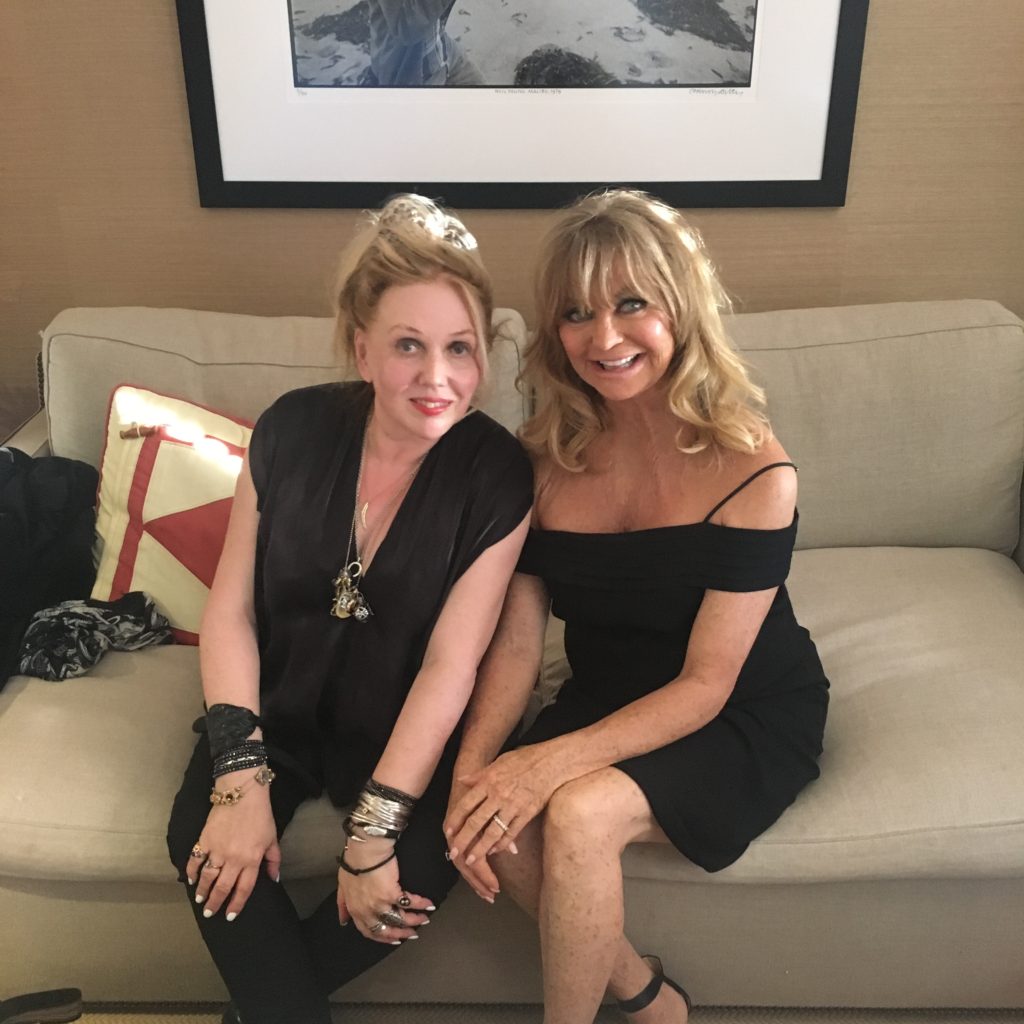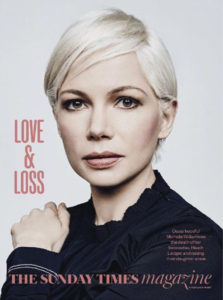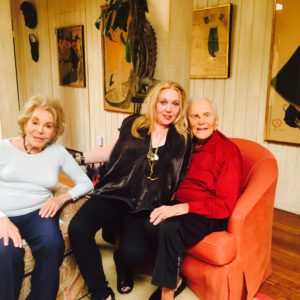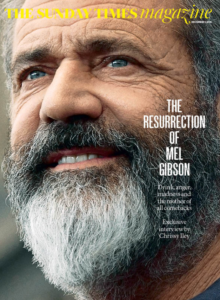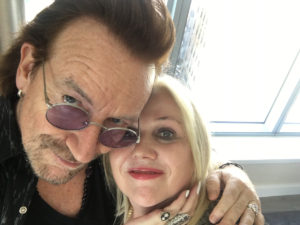 I’m standing side stage at the Boston Garden. I’ve just seen U2’s eXPERIENCE + iNNOCENCE show – it covers the optimistic power of innocence and the folly of experience. It’s a life looking forwards and backwards, to dark and light. It’s personal and it’s political. It’s Bono’s life. For the final number there’s no gratuitous group bow, no basking in audience adulation. It’s Bono alone with a single lightbulb, staring at a replica of the house he grew up in. A Bono dolls house.
I’m standing side stage at the Boston Garden. I’ve just seen U2’s eXPERIENCE + iNNOCENCE show – it covers the optimistic power of innocence and the folly of experience. It’s a life looking forwards and backwards, to dark and light. It’s personal and it’s political. It’s Bono’s life. For the final number there’s no gratuitous group bow, no basking in audience adulation. It’s Bono alone with a single lightbulb, staring at a replica of the house he grew up in. A Bono dolls house.
He comes offstage dripping – a little breathy. Black jacket, black pants, black boots and a towel. We swoop into a black SUV. Other SUV’s are lined up behind but we’re number one.
A police escort will flank us as we speed through the city at night into the bowels of the hotel. But this moment is not just about rock star secrecy and protocol. It’s about looking at Bono, totally spent and soul baring. He talks in phrases about how he’s on the circumference of awkwardness about the reconstruction of the American Dream, not making sense. He’s undone by this show.
I hold his hand. His is a weak but intense grasp. Apparently, a lot of people loathe Bono. I can tell you that no-one has loathed Bono more than Bono has loathed himself, but more of that later.He can see the contradiction in his situation, raging conscience straddling galloping success
Usually it’s his wife Ali who collects him from the stage and puts him in the car. Once it was Oprah. Today it’s me, so if you don’t like Bono stop reading this now. We are friends. I’ve known him for 20 years since we first met over poached eggs in the Savoy several albums ago. I’ve seen him operate first hand in the White House during the Bush regime, I’ve seen him seem to shrink stadiums with his big charisma and soaring voice, I’ve seen him at home as a daddy, as a husband. But I’ve never seen him shake when he comes offstage.
I’m not reading this hand holding as a display of affection. It was more that he needed a hand to ground him. His eyes looked sad and careworn behind his lilac tinted glasses. He had a stubbly face which gave him definition but strangely also a vulnerability. It was as if his face was smudged.
We’re now in the bowels of the Ritz Carlton hotel but it could be any car park anywhere in the world. He is escorted to a lift that will take him to his floor and he will stay in his room. I go in another lift to the lobby where there’s a nice bar and various people who work for U2 are starting to congregate.
The Edge will come down and his wife Morleigh Steinberg who is a creative consultant for the show, but no other band members. They’re all in their 50’s. They’ve been on the road for 3 consecutive years and one senses that they need to preserve their energy for the next night’s show.
Adam Clayton, bass guitarist, gave up alcohol in the 90’s around the same time as he gave up supermodels. Larry Mullen, the drummer has never been a party animal. He’s much too reserved and now he has an hour of physio after the show because all that drumming takes it out on his arms, neck and back.
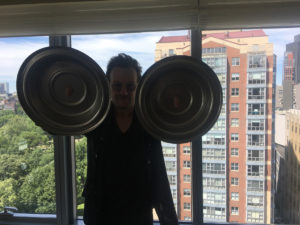 The next day I’m in Bono’s Penthouse suite. Room service has delivered lunch of chicken and greens. He takes the metal covers from our lunch and clashes them like cymbals.
The next day I’m in Bono’s Penthouse suite. Room service has delivered lunch of chicken and greens. He takes the metal covers from our lunch and clashes them like cymbals.
There’s a clashing noise at the very start of the show where it mimics the deafening sound of an MRI scanner. It’s about facing death. Bono says, “It’s not a very sexy subject, mortality, is it? But what is sexy is being in a rock and roll band and saying here’s our new song, it’s about death.”
Yeah about as sexy as working the circumference of an embarrassment and awkwardness. He nods cheerily. “Yes, that’s right. The end of the show is when you go back to your house, the home you grew up in. You think that’s who you are. But I’m no longer in Cedarwood Road (the house that he grew up in). I’m now facing a different direction. Does it sound pretentious to say that we are an opera disguised as a rock n roll band?”
Yes, it does. “When opera first started out it was punk rock. Opera only became pretentious. Mozart had a punk rock attitude.”
Let’s maybe not say it’s opera. Let’s just say there are grand themes in the show and it’s not just a bunch of songs. “Right,” says Bono. There was a part in the show last night where he was saying how he lost his head along with Adam (Adam going off the rails is well documented) and then he continued, “and then it happened to The Edge and Larry later.” The Edge looked askance.
When did The Edge fall off the edge? “OK, I was just saying it because I was feeling a little mischievous. I don’t like seeing them looking smug. The Edge, a zen Presbyterian looked a little miffed and Larry looked ‘this could be true?’
He is laughing but he’s thinking seriously about change. “Who would want to stay the same is what I’m really talking about. If success means that you trade in real relationships and real emotions for hyper media centric ones then maybe success is not good. But that’s not what success has done for me. You have a dizzy moment where you think your daily toil is of interest to the general public then you realise it isn’t really.”
Kind of tough to be performing in stadiums and thinking that you’re of no interest to the general public. He corrects, “I mean early on in the 80’s I remember being very self-conscious and thinking what newspaper I choose to buy in the newsagent was going to define me. And I remember hanging out with Chrissie Hynde who was so totally herself at all times. It took me a few years to get there.”
He thinks he wasn’t himself for decades. “In public I had different selves and all of mine were pretty annoying. We went to the film Killing Bono and I said to the Edge about the actor playing me, what’s that accent he’s speaking in? That’s not my accent. And The Edge said ‘it’s not but it’s the accent you used to give interviews in.”
The actor must have researched it from old interviews. “It’s like people have a telephone voice, a telephone personality and I had one in the 80’s.”
We both talk in our telephone voices for a while and laugh at each other.
“What happened with my accent was that I had a Protestant mother and a Catholic father. Dublin Protestants tend to have less of an accent because of their Anglicised influence.”
Was this accent purposely odd so that people couldn’t define if he was Protestant or Catholic?
“I don’t know. To be clear I didn’t know I was doing it but if you have a musical ear you can take on any accent.”
I give him my famous accent test which is to talk with a Geordie, Welsh and Pakistani accent and then repeat and repeat and see how long it takes before they all become the same. And after that it’s Australian, New Zealand and South African. And because I’m winning he suggests we might do Dublin Northside and Dublin Southside.
“I had a fear early on when I moved to the southside of Dublin that my kids might have a southside accent and sound like spoilt brats. One night I was coming home with Ali to our house in Temple Hill when I heard a party going on up the road so I said Ali let’s go over and find out what the neighbours are like. She said ‘you can’t just walk in on them and’ I said just for a laugh. She went to bed and I wandered up the road and I walked in to this party. Some cool music, some uncool music, some friendly, some gave me some attitude. One of them, let’s just say he was called Cormac and he had a Mohawk and a bit of attitude and decided to give me some grief. Because I’m a successful singer in a big old rock band and this is 1988. And eventually he says in that Dublin 4 accent, the southside accent, ‘I’m an anarchist.” I grabbed him and lost my temper for a second and grabbed him and said, ‘Cormac, you’re a fucking estate agent,’ because I knew that’s what he’d grow into.
The next day Ali asked me how the party was and I said there was exactly the percentage of arseholes to really cool people that I grew up with in Cedarwood Road, no different.”
The blinding summer sun streams in and we’re submerged in the hot breath of the humidifiers. Bono doesn’t touch his lunch.
In a recent Rolling Stone interview Quincy Jones said that when he goes to Ireland Bono always insists that he stays in his castle because it’s so racist there. Which castle is this?
“I love Quincy. I saw him recently and gave him all the love I have in my heart but I don’t have a castle.”
He does have a Victorian folly at the end of his garden which Quincy may have stayed in. Most guests do. When I stayed there, there was a wall signed by President Clinton and Hillary.
“Now that I think about it he did tell me that he had some racist incidents in Ireland in the 60s and I said it’s not like that now. Come and stay with us.”
Quincy also said that U2 were never going to make a good album again because it was too much pressure. “Yes, and Paul McCartney couldn’t play bass. We’re all having these meltdowns apparently. Most people accept that the album we’ve just made, Songs of Experience is right up there with our best work. It certainly had the best reviews.” The single Love is Bigger Than Anything In Its Way is currently No.1 in the Billboard Dance Chart “which we haven’t been for a very long time.”
Despite what he says it must be a pressure to come up with songs like One or With Or Without You or New Year’s Day or In The Name of Love. Songs that have defined decades.
“One of the reasons U2 are so regarded in the US is because black artists like Quincy Jones have always championed us. And back in the day, Donna Summer. Our music wasn’t rooted in the blues and they found it fresh but also not alien. It’s in some ways harder you might argue to relate to it if you are an indie kid than if you are black and American.”
There’s a section of the show where we see a film showing the neo Nazi riots in Charlottesville. The desecration and reconstruction of the American Dream. This he tells me will be restructured for the European shows. How does he think the Nazi stuff will work in Europe when they start their tour in Berlin?
“We will rethink it but there’s plenty of Nazi’s right now in Europe. I think we can reimagine it with the same spine.” In fact, they decide to start the European shows with Charlie Chaplin’s speech from The Great Dictator. “Dictators free themselves but they enslave the people! Now let us fight to fulfil that promise! Let us fight to free the world – to do away with national barriers.”
“In many ways it’s a narrative based show. This is our story.” The show is personal and political. in the US it aimed to coalesce the centre and bring both sides into a common ground, as outsiders to the US they would not presume to critique. But it held up a mirror and was timely to what was happening there and then. Europe it is a different matter. It’s their home and inspiration. It’s what made them and it’s where they, their families and friends live their lives. Of course they’ll make statements about the rise of the far right. That’s their tradition. Rock n roll with a conscience.
Of course this show seems to be about Bono’s actual life, ono’s actual street that he grew up in etc. but it’s a metaphor for all of their lives. Ts his voice that carries their story. He speaks for all four of them, woven into a singular voice. Bono is the conduit and the lightning rod but it’s about all of their experiences. They are U2. They are a band. It’s not the Bono show although he is a showman extraordinaire.
“One of the stories we tell about ourself is about our country. Countries don’t actually exist, they are drawn. Part of coming to eXPERIENCE + iNNOCENCE is realising that history can change and what we are witnessing in the US right now is that it’s rewriting itself with darker tones. We’re here in search for America at a time where America is in search of itself. It’s happened a few times over the life of U2 but we are looking for the same thing the country is.”
U2 and Bono specifically has always been close to the American dream and those who dreamed it. Bill and Hillary Clinton were not only invited to his “castle” where he signed the wall – I saw it there. A + B = a bed for C. But only the other week Bono went to visit Bush apparently?
“I did. I saw the 44th president last week. If you do work with people you don’t just cut off from people. I’m still close with Obama (he hasn’t stayed in his castle) “but he and his missus and his kids have been in our local pub.
I don’t like to think of my relationships with these people as retail. I like to think that having gone through some stuff together we stay together even when they’re out of office.
I saw George Bush on his ranch. He spent $18 billion on anti-retroviral drugs and I had to thank him for that.”
Last week he also met Vice President Pence because he at some point was involved in PEPFAR Was he helpful?
“Well…we haven’t had the vicious cuts that the administration proposed. I would have to say that Congress have played the largest role in this.”
And what about the orange one? “I’m wise enough to know that any sentence with his name in it will become a headline so I just don’t use his name. It’s nothing personal. It’s just you have to feel you can trust a person you’re going to get into that level of work with. Lots of my leftie friends doubted I could work with George Bush but he came through as did Tony Blair and Gordon Brown – came through in a way that changed the world on development. If they had not made development a priority, other presidents would not have. They made the lives of the poorest a priority for rich nations. 45 million go to school because of debt cancellation.”
And the orange one? Is he with your plan? “No, he’s trying to cut all that stuff at the moment which is why I don’t want to be near him. If he’d put down the axe maybe we could work with his administration. But we can’t with the sword of Damocles hanging.”
We talk about Ivanka Trump and Bono says, “I have no doubt she has the intention to try and move the gender equality debate.”
As does Bono himself. At one part in the show there’s a screen saying ‘Poverty is Sexist’. The show takes place essentially in a round. A cage which sometimes encompasses the band is also used as a screen for the Anton Corbin film where in his potent trademark black and white film, we see children going to school, having their breakfast, wearing army helmets. A nation, a world at war where the children are in danger.
“We started Poverty Is Sexist a few years ago before the #metoo movement. We were getting messages actually from our daughters. You can’t solve the problems in the world using half the brain power that’s available. He worked closely with Harvey Weinstein on the Mandela movie Long Walk To Freedom (2013) where he won a Globe for the accompanying song Ordinary Love.
“He did very good work for U2. My daughters are very unforgiving in this regard whenever I get philosophical they tell me, ‘it’s not your time to speak on this.’”
I can’t tell if it’s sadness I see in his eyes or just tiredness but there’s still optimism, there’s still solutions.
“There are certain institutions that have kept the world in balance like The UN, The EU, The Breton Woods Institution, The World Bank, The IMF. All of these things whatever your position is on any of them you’ve got to admit that there’s a complete transformation of institutional norms as well as international behaviours. Whether you’re an artist, an economist or a voter you can’t not be interested. At least after Brexit, people are arguing, educating themselves.”
Isn’t it crushing to be such an optimist? “No, I’m cautious. For many people in the United States they are grieving after the last election. A death happened. A death of their innocence. And my attitude to that is it’s OK to wake up out of this naïve view of the world where we thought the human spirit would evolve naturally and the world was getting more fair. There is no evidence in 10,000 years to suggest that there’s a forward motion.
It was Dr King who said the moral arc of the universe is long but it bends towards justice. We don’t see evidence of that. I want to believe it’s true but in my lifetime there’s never been a moment like this where you actually think democracy is not a given.”
We talk of mothers separated from babies as they crossed the border and this action being backed up with biblical quotes. “The One campaign fights against the injustice of extreme poverty. People don’t arrive at the border risking life and limb without real purpose. We are Irish people who were economic refugees. We floated past the Statue of Liberty. The idea that we would be separated from our children when we got off the boat…..you could say the European Union was the invention of America. If you think about the post Second World War that was an investment in protecting and unifying Europe because the Americans were smart. General George C Marshall had the wisdom to invest because if we succeeded we would buy their products.”
The Innocence and Experience show is indeed about political grief as well as personal. One minute you’ve got Bono jumping around the room with the room service lids and the next he’s deeply sad.
He said that the poet Brendan Kennelly said he had to write every song as if he was already dead?
“Yes, to imagine yourself free of ego or concerns about what people think about you.”
Was this about his own near-death experiences? By this I don’t mean falling off his bike and having a 5 hour operation November 2014. After he broke his arm in 5 places and his eye socket. At the end of last year he was seriously ill.
“I mean I don’t want to speak about it but I did have a major moment in my recent life where I nearly ceased to be. I’m totally through it stronger than ever.”
He’s talking about this as if he had a decision in it. Did he have a choice whether he could go through it or not?
“No. I didn’t. It wasn’t a decision. It was pretty serious. I’m alright now but I very nearly wasn’t.”
No wonder this has changed the course of his songs, so many that question mortality, that others are letters to his children and wife, reflections, conversations with his younger self about how things could have been, should have been.
“Funnily enough I was already down the road of writing about mortality. It’s always been in the background.”
Sure it has. How could it not be? He was 14 when his mother died. Iris had a fatal aneurysm at a family funeral. He’s always liked to point out how many rock gods lost their mother like John Lennon. Initially he and Larry bonded over the death of their mothers. It was always in the background.
“And then it was in the foreground.”
Did he have a premonition that it was going to happen? “No but I’ve had a lot of warnings. A fair few punches over the last years.”
Like falling off the bike? “That was only one of them. There were some serious whispers in the ear that maybe I should have taken notice of. The Edge says I look at my body as an inconvenience and I do. I really love being alive and I’m quite good at being alive, meaning I like to get the best out of any day. The way I’m set up as an artist is I don’t see the songs as being art or the being in a band. I see life as being what you express yourself with. I certainly have a renewed vigour because it was an impasse. It was the first time I put my shoulder to the door and it didn’t open. I’ve always been able to do that and now I feel God whispered to me. Next time try knocking at the door or just try the handle. Don’t use your shoulder because you’ll break it.”
And this has had an impact on practical things like touring?
“Yes. I can’t do as much as I used to. On previous tours I could meet a hundred lawmakers in between shows and after the show and now I know that I can’t do that. This tour is particularly demanding and it asks of me that I prepare for it daily, that I concentrate on it so I can give myself completely. That’s why these shows are so great. I prepare for it and my voice is stronger than it has been. Have you heard about that Michael Gladwell book the 10,000 hours?”
It’s about you have to put 10,000 hours of work into something to be any good at it?
“I think we just got to 10,000 hours. It’s not genius. It’s just 10,000 hours. I’m not there yet but the band are. They are at their peak. Early on we were good, even great but I didn’t think we were and I didn’t tell them that and I was probably the weakest but I was the front man. I could grab attention. I could propel the songs. They’ve turned in their 10,000 hours and are on a whole other level right now. But nobody’s gonna tell me they saw U2 on another tour and they were playing better. It’s not gonna happen.”
Perhaps it’s because he has a feeling of completion. That it can’t get any better. If you start your show with an MRI and end it onstage alone with a solitary lightbulb, the metaphor is you come in and out of the world alone. He’s 58 but maybe he has lived his life in dog years.
“Everybody gets to this place. Whether you have a face-off with your own mortality or somebody close to you does, you are going to get to a point in your life where you ask questions about where you’re going.” Does that mean this is the peak? There won’t be another U2 tour after this?
“I don’t know. I don’t take anything for granted. U2 in this moment with these songs, these love letters, it’s some of our best work and I’m not sure that can be said about a lot of people who’ve been around this long.”
Bono has always lived in fear of U2 being dubbed a heritage act with greatest hits tours. Last year they did The Joshua Tree tour, not just the hits, they played the whole album.
“As if we’d never recorded the album. As if we’d put them out that year. It’s OK to acknowledge work you’ve done and give it respect, but if it’s the best we can do then we’re not an ongoing concern.”
He tells me that a critic once said ‘being at a Stones show makes people feel good but being at a U2 show makes people feel good about the person who’s standing next to them.’
I tell him the joy of being at a U2 show is that it just makes you feel who you are. The songs and visuals stretch your intellect as well as unfold your emotions.
He winds back to his personal apocalypse and I wonder if his younger self would be disappointed with his older self.
Would his younger self have approved of the album Songs of Innocence gifted to everyone on iTunes? Some people appreciated it more than others?
“We were experimenting. It was intended to be generous. The intention was never the over reach that it appeared to be. I’m not sure that my younger self would approve of where I’ve got to but I like to think that if my younger self stopped punching my face, my younger self would see that I’ve actually stayed true to all the things my younger self believed in. I’m still in a band that shares everything. I’m not just shining a light on troublesome situations, but trying to do something about them. I still have my faith, I’m still in love, I’m still in a band. What about your younger self?”
My younger self would say you fucked up on life, you fucked up on love, you loved all the wrong people at all the wrong times, you’ve been evil and destructive but hey, you’re in a Penthouse with Bono. My younger self would be yay, you made it!
Final word from Bono “You should be the singer of this band.”
Adam Clayton
I’m back in the Boston Garden Arena. In the winding bowels of the building the U2 production team weave seamlessly. They do this every day and most of them have been doing it for years with a level of loyalty that’s unquestioning. Most of the production staff are women, women who get things done. They pad about in dark jeans or cargo’s and Converse.
I first ventured backstage with U2 a couple of decades ago. There was a different uniform – a floaty maxi dress and platform shoes and women would run, not teeter in vertiginous heels across stadiums. Women no longer have to run in heels and it’s a statement U2 take on board.
I meet Adam Clayton in the guitar bunker beneath the stage. He gives me a tour of what goes on there. The Edge’s technician, Dallas Schoo, is lovingly poring over Edge’s 33 guitars, 25 which he uses every day. The bass guitars are less in number -about 18 but they make up for it in sparkle and Clayton has given them names.
There’s a lilac glitter guitar with a heavily studded strap that he calls Phil Lynott and a more gothic strap that he calls The Cure. They’re all lined up, ready for action. We climb up to the stage itself. I look out at the vast, empty arena and then clamber up into the long slim cage that wobbles. It’s where they perform a chunk of the show. The sides of the cage also double up as a screen for the films for the virtual reality footage and the political movies. I don’t like heights or enclosed spaces and Clayton, ever the gentleman, helps me down.
He’s wearing a Westwood T shirt and Sandalwood. His body is ripped, impressive. He likes to work out. He is 58. We part some makeshift curtains to do our interview which will happen at the same time as he’s having his physio. Soon he is naked but for a towel. The physiotherapist is on tour with the band and Clayton gets his massage before every show.
“I work out a lot – I run and do weight training in the morning so that tightens me up and then in the show carrying the bass and there are various other occupational quirks that affect the body. I have to make sure they don’t develop into real problems. It was a bit of a shock to learn that the things you could do in your twenties and thirties in terms of being a player, when you get into your forties and fifties, they cause repetitive strain injuries.”
Does he mean carpal tunnel? He’s playing his bass and his fingers won’t move?
“Exactly. But actually for me more of an issue is what it does to my hips and lower back, shoulders and neck. You just get so tight you can’t turn, you can’t move. When you go on stage you don’t want to be feeling those things.”
Hargen the physiotherapist is German and he speaks with a German Irish accent. He’s got strong hands that seem to know what they’re doing. Watching someone be massaged is quite meditative.
“It is. You make sure that your channels are open when you’re onstage. You don’t want random thoughts coming through your mind.”
Of course, there was a time in the nineties where Clayton was full of random thoughts and random excesses. The polite gentleman went wild. Fell in love with Naomi Campbell. His man part was the cover of ZOO TV, his inherent shyness replaced by rampant exhibitionism. He’s come a long way since then. He’s married to Mariana Teixeira de Carvalho, a Human Rights lawyer and has a new baby, Alba and his addictions end at exercise, designer T shirts and the perfect Sandalwood scent.
He’s more than come through it. He’s a spectacular player and he owns the stage. His bass guitar strut looks far from tight or injured. He’s pleased when I tell him his 10,000 hours show.
“Ah yes, from Gladwell.” He smiles. Random thought comes into my head. Why does it seem normal to interview a man who’s naked except for a towel, talking about sonic perfection?
“I use only about 6 or 7 guitars. Edge uses 30 different ones. He’s the one seeking perfection sonically. When we started from 1976 onwards, the sound of the punk band was the most aggressive and powerful thing that a teenager could hear and all the bass players were stars. It was much cooler than the guitar so from that point of view – I was. We are also a little more mysterious at the back. I’m a big fan of bass and drum. I realise it’s a bit niche. These days most modern records are programmed and synthesised bass and drums. It’s not real.”
Clayton likes the real thing. “Larry has special needs because for 40 years he’s been pounding something that has been resisting him. He has to get physio done an hour before the show and an hour after. He’s in pain and his muscles need to function properly. Drumming is the most physically debilitating thing you can do. These are things you do in your twenties and thirties. It’s the equivalent of a sports career where you shouldn’t really be doing it past the age of 35 but nobody knew that when rock n roll started and nobody realised it could be a long career. I guess the jazz players of the thirties and forties might have found that out and those people probably weren’t making enough to have doctors to help them. They probably medicated with heroin.”
Does he ever medicate? “If my neck is tight and painful I’ll take an Aleve (like paracetamol).”
Onstage it looks pure and loose but now I’ve learnt it takes a lot of massaging. Three consecutive tours have had an accumulative effect. It won’t continue like that.
“I don’t think so. It’s been good for the band’s playing and the band’s tightness and when you see how much Edge does – singing, keyboards, guitar, Edge is at the top of his game. Bono has learnt to master, to dominate these stages, but we’re due a break. The Joshua Tree tour was a runaway train. We extended it because it was popular and it suited our schedule because our album release date was moved. A lot of people work harder than we do but I think we need a break now. Being in front of audiences that are enthusiastic is an amazing pay off but being away from home for most of the year is gruelling.”
I was only on the road for a few days and I feel a strange kind of exhaustion from travel and from never being never alone. It’s a weird thing. Clayton is looking forward to a holiday “with the rest of the lads with the South of France.” They all have houses near to each other on the French Riviera. Extraordinary that they not only work together but want to holiday together.
“Yes, it’s perverse.” Is that some kind of masochistic syndrome? “No, what really works is we’ve known each other for a long time. Everyone now has children and there’s a whole group of friends that revolve around it so it’s a community and it’s nice to spend time together.”
They all still like each other? “Yes, I’m very grateful for it. I still think that Bono and Larry and Edge are the most fascinating people in my life. They constantly surprise me in terms of their insight, their development, their intelligence. When you find people like that you hang onto them.
We haven’t done anything to embarrass our younger selves. We were young guys coming out of the suburbs of Dublin that didn’t know anything but had a certain idealism of how we thought the world should be and we’ve honoured that. Our tours have always been based on more than crash, bang, wallop and video effects. They’ve meant something.
You learn things as you’re going. Trying to eat as healthily as you can and being in a healthy frame of mind helps you. We have an on the road chef who knows what we should be eating. I’ve gone vegetarian. I’ve heard so much about the meat processing business that I don’t trust anything. I’ve got high levels of mercury in my blood so I don’t eat fish. I’ve not drank for twenty years and that was a completely different life but I notice other people are heading that way. There’s now a theory in the UK that even one drink is harmful to you. I think that’s a bit extreme and a bit of a buzz wrecker but it does seem that alcohol is being thought of as possibly causing cancer.”
Not very rock n roll, is it. But maybe that’s old rock n roll where it was all about living for the moment, doing lines and drinking shots…all night. And now the challenge is longevity and not losing relevance.
After the show in the hotel bar in a cordoned off area, there will still be champagne and The Edge will be the only band member socialising because Edge never does extreme.
Clayton continues, “The longer you are off it the easier it is but I can never have just one. I see people who drink half a glass of wine and I get anxious thinking how can you leave that other half? But there are those people who can have just one glass and leave it and people who the minute they have one they’re off and their mood changes. It’s a powerful drug and a powerful industry. I wonder if the legalisation of marijuana is going to be competitive.”
They have worked the last four summers, either touring or recording. Clayton looks forward to family time and enjoying his daughter’s first birthday. It’s hard to tell if I’m sensing that this could be the end or whether he’s just looking forward to the break.
“Albe really does love banging musical instruments. And she has an eye for looking at the light and noticing. I’m happy to say that there are strong signs that there is an artistic soul in there.”
I’m wondering if his massage therapist has remote superpowers. It has relaxed me too. Clayton’s is the most sophisticated sandalwood. It doesn’t punch you. it gives you a comforting embrace. Edge 56 Bono 58
Larry Mullen was in fact the founder of the band. Mulen is still the heartbeat. Nothing happens without him. He provides dignity, strength. He also has a Dorian Gray thing about him. He’s always looked much younger than his 56 years. He’s always fit and I’ve always loved those drummer’s arms. As we chat in the Boston Garden Arena before the show, he tells me that these days those arms don’t come easy and neither does the drumming. He has to work out, he has to have intense physio.
“It’s not so rock n roll but it’s what you have to do to get yourself up to this. I don’t come from that kind of discipline – the same as the jazz drummers. Technically it’s complicated and physically it’s a different thing.”
He means he’s not the kind of jazz drummer who sits mellow and still and only the arms move. “I’m a street drummer. When you throw yourself about and after doing it for a long time you just can’t quite do it in the same way.”
For Mullen, constant touring has been hard and not just on the arms. In the nineties after a huge tour he simply took off on his motorbike and disappeared with some kind of reaction against the band and also an inability to cope with being home, but that’s long since been worked through. He’s had ambitions to further his acting career. I’m sure his deep, thoughtful presence is an interesting cinematic one. He has had parts in the films Man on the Train in 2011 with Donald Sutherland and A Thousand Times Goodnight with Juliette Binoche in 2013.
“We’ll finish this out and then there will be time to decide what we want to do next. I’d like to take a really long holiday.”
There’s something in the way he says it, not just tiredness, that make me think maybe this really is it.
“I don’t know. You never know. I assume there’ll be another album. I don’t know when and I’d like to think we have some time to consider it. I don’t know that anybody needs a U2 record or a U2 tour anytime soon. People could do with taking a break from us and vice versa.”
Will he try to resume acting? “I’d like to but I had to put all that stuff on hold. The problem is if the tour gets changed the album gets released at a different time, all bets are off. My agent said ‘I can’t do this because you’re just not available so I think I will re-employ the agent and tell them I won’t be doing this for a couple of years. I’d like to do something else.”
Shouldn’t the agent have kept him on the books? “Well, in fairness it was difficult. I wasn’t answering the phone.”
And that’s Mullen for you. He’s not an answering the phone type.
While Mullen goes for his physio I am in catering perusing selections of cheesecake and pasta and soup. I meet Willie Williams the shows creative director over bowls of spaghetti.
This is his twelfth world tour with U2. “What’s been fantastic about working with U2 for so long apart from the fact that they are who they are, is that they’ve always done big, ambitious projects. Then they take a hiatus so I’ve been able to have my own life back and I don’t feel it’s been taken over.”
Williams recently has installed lighting for the Hakkasan group in Vegas. He has designed a centrepiece – a spaceship chandelier at Caesar’s Palace.
Williams also constructed the Innocence tour which was similar in its staging but it’s interesting to see in three years how much technology has moved on.
“For them it’s about finding the connection between spectacle and emotion. We tweak the show as it goes along. The joy of this show is we start with a narrative. We spoke for a long time about the band growing up in Dublin and honing their story so we could tell the experience part of the journey.”
At the time we speak, he is redesigning the show for Europe – the general theme will be Europe at a time of crisis. The European flag will replace the US flag. That should be nicely controversial in Brexit Britain.
There is a cityscape for every night which is redone for every city of the tour. When I see the show this time, Bono has selected different seats for me because he wants me to see other aspects of the show. His attention to detail is like that. For me, it was interesting to watch the stage after having been under it and on it.
After the show we’re back in the hotel bar. It’s Edge and Morleigh’s wedding anniversary. We all eat handmade chocolate cake. It’s a group of people who know each other really well and can move instinctively and swiftly with each other.
The next day we all travel from Boston to New York on Amtrak. U2 have reserved an entire carriage for cast and crew. Once we arrive, the set must be built immediately at Madison Square Garden for their 4-day residency. Edge is the only band member on the train – the others all left after the gig last night to see their families. Edge’s wife and daughter are here with him. Did he give Morleigh a gift for their wedding anniversary?
“You get special dispensation when you are on the road – she is with me and that is the best present.”
He’s very smiley when he talks about family and equally smiley when he talks about guitars. Does he really use 33 each night?
“It’s possible.”
We talk about how in the early days he only used one guitar which meant that Bono had to hit some very high notes.
“These days we try not to do that to him, we try to save his voice. He does hit some very high notes. He has a good range. A ‘B’ would be his top note these days but he has hit ‘C’ which is what a top tenor would hit, which is very, very high – an opera singer would hit that maybe once a night.”
I sense a strong concern for Bono.
“Bono has a very ambivalent attitude to his physical self. He doesn’t naturally take responsibility for his physical well-being, he is more about other things and the body just comes along with it. Which is fine in your 20s but you get to a certain point… somebody once said for the first 30 years your body looks after you and supports you then you have to look after your body. It is a difficult shift for him.
“It is a difficult shift for anybody who is living in the moment, considers himself an artist. It’s about being current, being present. If you spend too much time thinking you are old and past it you probably can’t do it anymore.”
This is the dilemma they all face. Take care of themselves but not so much care that they are over thinking it.
On the road places them in a kind of cocoon. They’re with your rock n roll family doing the things that they always do. It’s not so much holding back the years but not acknowledging their existence. If they think about being old, it becomes difficult to feel relevant.
We see passengers on the platforms peering in. Perhaps they can spot the odd vacant seat in our carriage. They wonder why they can’t get in. You feel set apart, not so much alienated but special.
“As you can see, it’s a family experience on the road, we are surrounded by the people we love so it’s not as alienating as you think although I am not under any illusions that we are not to some extent institutionalised by being a member of U2. How could you not be?”
The train rocks along.
“I must say I am really looking forward to not being on the road.” (They have a break before their European tour starts August 31 in Berlin). “I am sure there will be a withdrawal of a certain type but I think the minute you feel being on the road is normal is when you know you have got to get home fast.”
“The physio keeps us from not getting in trouble in the physical sense. What we do as a guitar player or drummer is use the body in a very unnatural way. It’s like a tennis player; there is a lot of asymmetrical movement. Your body will change shape to make that the norm which plays havoc… I get to the gym when I can, I am not a big believer in heavy weights and the like, I care more about flexibility. I used to do yoga.”
Edge isn’t fanatical about the gym, he’s not fanatical about anything. He is measured, he has always been the balance of other band members excesses.
Does he have Morleigh on the road with him the whole time?
“No, I wish. She was director in residence for a while when Willie was away. She was our eyes and ears in the audience and helped tinker with the show. It’s a constant process trying different things and she has helped Bono over the years with his use of the stage. Her background is modern dance so it’s all about the visual medium; the shape of the show.”
Their daughter Sian is very smart and engaging. It’s her image that is used for the Poverty is Sexist visual and she’s also on the cover of the album along with Eli Hewson. Last night in the bar, she and I bonded over dyslexia.
“I am sort of dyslexic when it comes to music,” says Edge. “I am totally instinctive. I use my ear and am not technically proficient. I am very lazy so I know just enough music theory to get by.”
The other night on stage he looked perplexed when Bono said that he and Adam had gone off the rails and it happened to Edge later.
When did that happen? He laughs, knowing that he has never gone off the rails. The eyebrows arch as he briefly ponders just how devastating that would have been, not just for him but for the rest of the band.
“I have been pretty together through the years – I am sure we have all had our moments and lost our perspective and started to buy into the bullshit. That’s the hardest thing, to hold on to the perspective. The general rule is that everybody involved in any endeavour always overestimates their own importance while simultaneously undervaluing everyone else; once you realise that you can start catching yourself.”
I even caught myself feeling put out because the second night at the hotel the U2 crew did not have the whole bar to themselves as we’d had the first night. We were given a cordoned off area within the bar. And that is me after two days. How could I become so arrogant after such a short time?
“Good question. I think we all have that tendency to enjoy being made a fuss of. It’s a Seamus Heaney phrase, ‘Creeping Privilege’ you have got to look out for it because it can turn you into a monster or somebody who needs help, a victim. And you don’t want to be that.” He laughs his wise laugh.
“That is the good thing about being a band member, we all spot each-others tendencies to go off track. We are peers and equals. Which is not a given because solo artists have no peers or equals.
“We are not afraid of bad news. In the beginning we had to work hard to get anywhere, it was always a struggle. That’s just how it feels, we enjoy the fight and the internal struggle to get where we feel we need to go and a sense that we have got to fight for our position to maintain where we are at creatively and literally.”
Edge has optimism. Edge sees the past, sees the future and would never let U2 become a heritage act.
“Yes, and we should not feel entitled. Because the other part of this creeping privilege is that you get to the place that you think you are entitled just because you are a name and you’ve been around a long time.”
They keep each other in check. Do they actually criticise each other?
“It generally doesn’t have to be said, it just becomes clear. That’s the nature of our band culture. These things get figured out. There have been very few times when we have had to have what you might call an intervention. It’s basically what friends do for each other because that what we are; a bunch of friends. And even when we are not touring we will all be in the south of France with each other. Recently I have been mostly between Dublin and Venice, California. I am trying to build a house in Malibu but not having much luck. Hopefully in the future I will be there. Meanwhile, we are renting a place in Venice, low key, not a big house on a street. It’s grounding.”
“Touring to me is not the same as travel because you are in a bubble. I still try to get out even if it’s just going for a walk in a park, a bit of shopping, maybe a bar, there is something really educational about travelling. Our kids have to travel to see their dads and I’ve watched how their attitude to the world opens and their acceptance of difference is just a natural by-product of seeing the world. It’s healthy. Being insular in your own little group is not.”
“We have made two of the most personal and introspective albums of our entire career but the show is very political so I am hoping to open it up in more Euro Centric ways. But the music, that’s personal.”
The political only becomes meaningful when it relates to the personal. There is of course a bond between the Americans and the Irish. A statistic claims there are 40 million people of Irish heritage in the US. The desecration and reconstruction of the American dream is also an Irish dream. The European tour will be different because the European dream doesn’t exist in the same way.
“We are hoping for a global dream which is hopelessly idealistic. Let’s start with getting the West on the right footing. If you are ready to look into it on a deeper level an anthropological level you will find that during times of crisis people instinctively reach for the monster they think is going to protect. That can be a movement or an individual. In the US it seems to be a bit of both. For sure the orange one with the help of some very smart advisors has tapped into a movement of disaffection which has clearly been brewing for 20 years.
“I was just in Washington on Capitol Hill, all these neoclassical edifices – the statement is of power. Not the power of an emperor or a king but the power of the state. If you are a miner and you are in Washington worrying that you’ve lost your job or health care it would be so intimidating. Someone like Trump talks to the guy at the end of the bar somehow you relate to him. This is a guy who is pretending to represent ever man and he is the most elitist. So many levels of irony. If you look at the longer arc of history what we are seeing now is a backward step.
“The actual drift is in this direction and a positive thing but it relies on respect in the sense of pluralism which is my culture, your culture; my religion, your religion. People have very strong religious ides which we find crazy, dinosaur deniers. Some people who have whacky thoughts; extreme Christians, extreme Muslims to be able to understand where they are coming from and not demonize or look down on them and not say, ‘Your reality is not as valid as my reality’. The problem is that the divisions are big. Europe, weirdly enough on some levels, has less diversity than America. Europe is post Christian for the most part, in America they share a common language but a huge diversity of world vision. In Europe we have cultural difference, linguistic differences, political differences. If we keep our never EuropeEloper can survive and we can all pull together. Brexit is, of course, a bit of a set-back, but we’ll figure it out.
“Picture us at 16 or 17, we were a really awful, terrible band. We managed to persuade the powers that be to let us play a short set in the school disco. I remember everybody gathering into a little room in a panic because we realised, of the songs we were about to perform we had never managed to get to the end of any of them. So now we can get through the songs and we have sold a few records, we have had a long observance in the same direction and that has gotten us where we are. In other words, total blind thinking.”
They started off with the very smart thinking Paul McGuiness as their manager, who remained from the start until 5 years ago.
“To be fair, we found him. He had done a little bit of management of a Dublin band but his day job was in the world of advertising, commercials, assistant director, he had worked on a couple of movies.”
It was his concept that the band should split everything equally four ways. This levelling seems to have been genius thinking. So many bands split up because of egomania and in band rivalry.
“It was a piece of genuine wisdom – he had heard why so many bands disintegrated. It took us about three minutes to consider and go, ‘Yes, that’s a good idea.’”
We talk about science because he’s intrigued where intuition and science meet, the logical brain and the poet brain. They meet in The Edge’s brain.
When the train pulls into Penn station we head off in opposite directions. I’m already sad to leave behind my rock and roll cocoon. Feels like family. I already miss the fact I won’t have a show to watch that night. People to meet after the show…. talk about guitars and lost dreams and reconstructed ones……what if it really is the end?
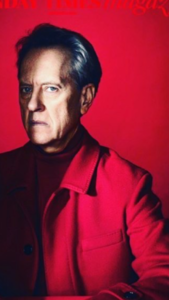
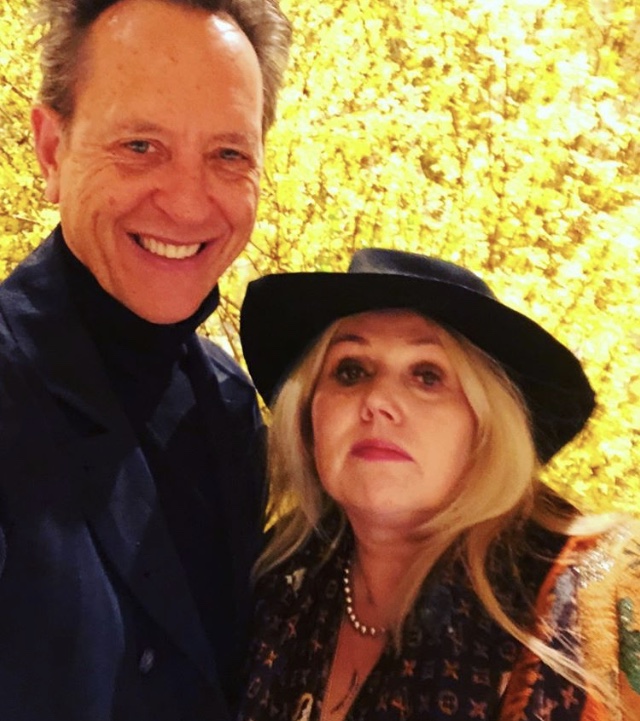
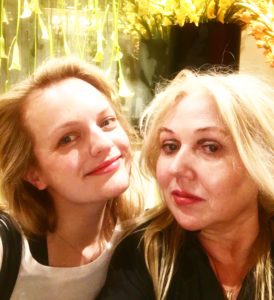
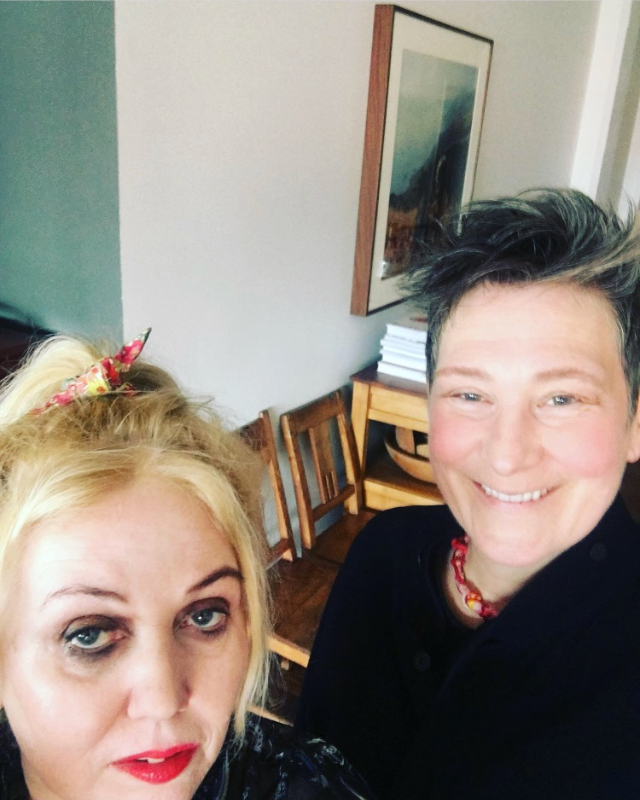
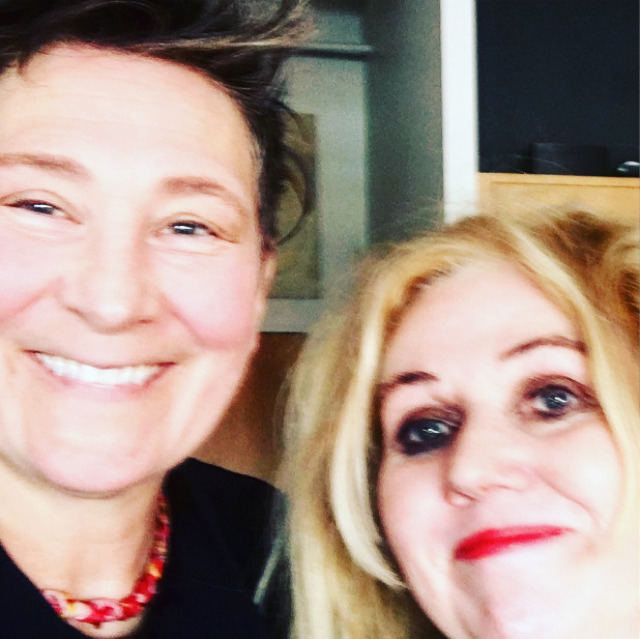
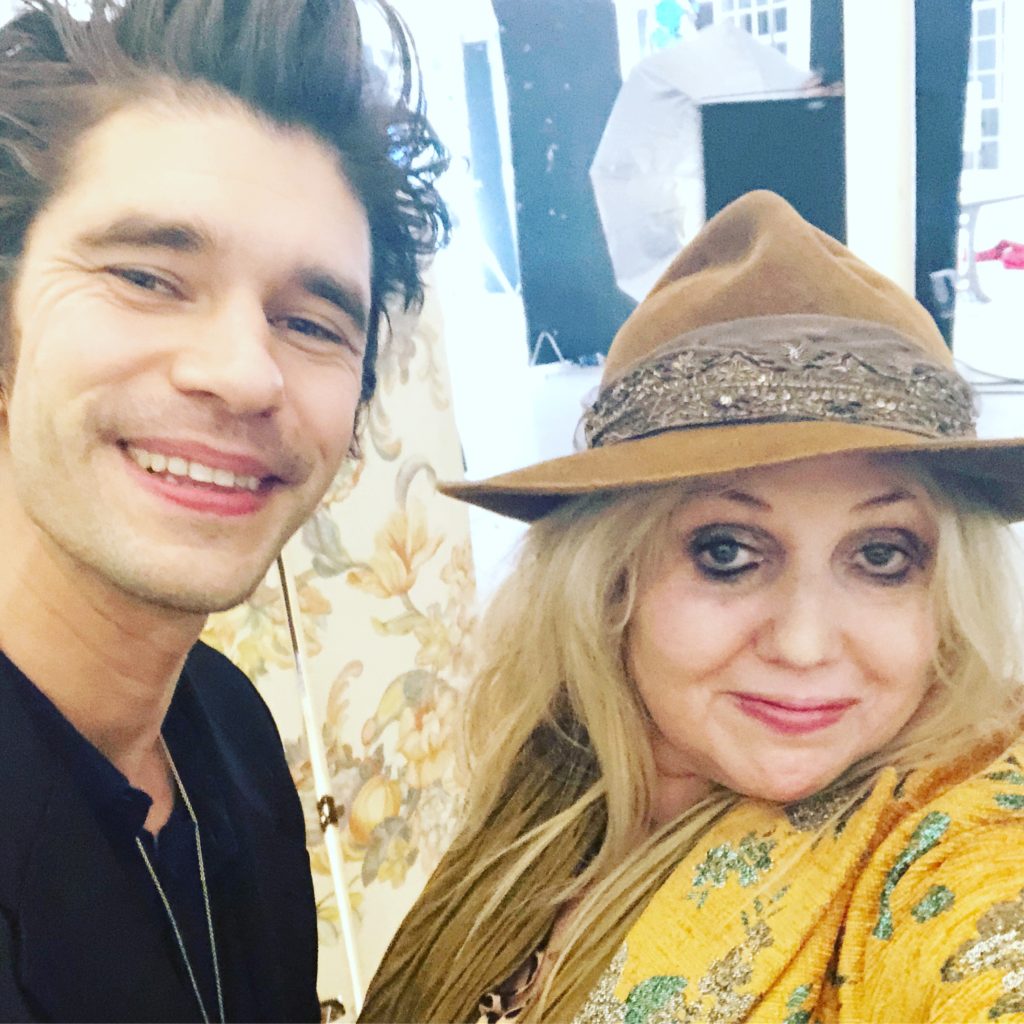
 I’m standing side stage at the Boston Garden. I’ve just seen U2’s eXPERIENCE + iNNOCENCE show – it covers the optimistic power of innocence and the folly of experience. It’s a life looking forwards and backwards, to dark and light. It’s personal and it’s political. It’s Bono’s life. For the final number there’s no gratuitous group bow, no basking in audience adulation. It’s Bono alone with a single lightbulb, staring at a replica of the house he grew up in. A Bono dolls house.
I’m standing side stage at the Boston Garden. I’ve just seen U2’s eXPERIENCE + iNNOCENCE show – it covers the optimistic power of innocence and the folly of experience. It’s a life looking forwards and backwards, to dark and light. It’s personal and it’s political. It’s Bono’s life. For the final number there’s no gratuitous group bow, no basking in audience adulation. It’s Bono alone with a single lightbulb, staring at a replica of the house he grew up in. A Bono dolls house. The next day I’m in Bono’s Penthouse suite. Room service has delivered lunch of chicken and greens. He takes the metal covers from our lunch and clashes them like cymbals.
The next day I’m in Bono’s Penthouse suite. Room service has delivered lunch of chicken and greens. He takes the metal covers from our lunch and clashes them like cymbals.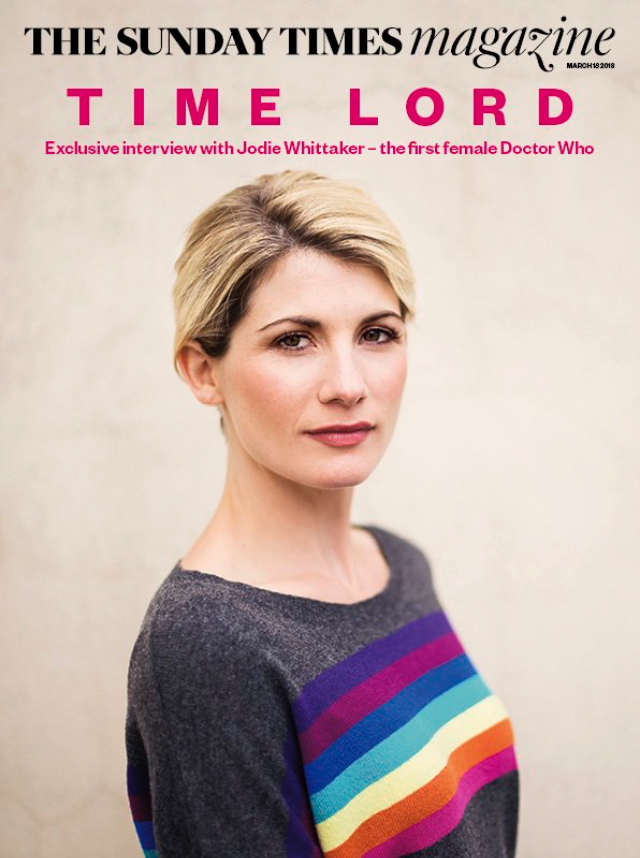
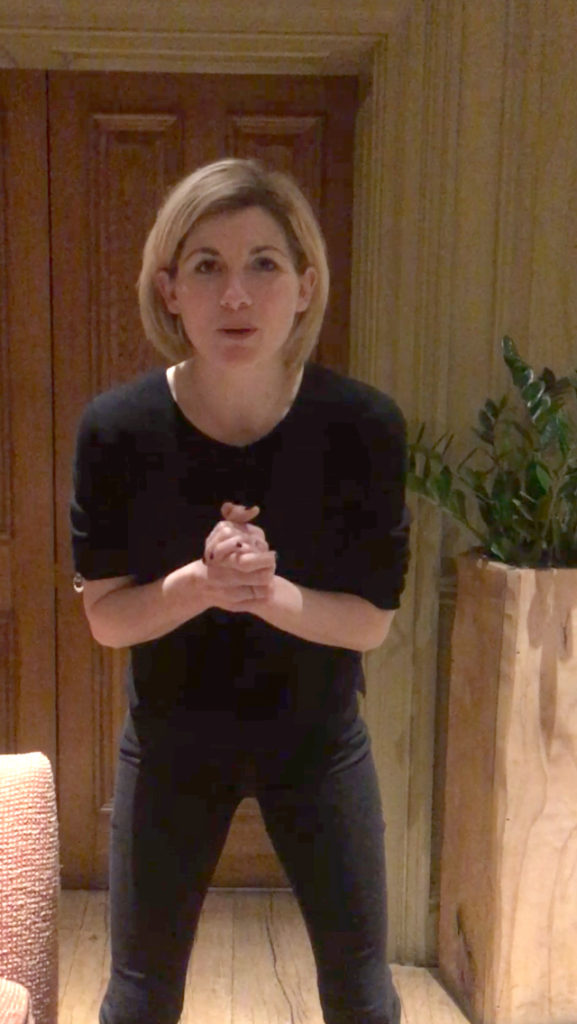 When I meet Jodie Whittaker she is dressed entirely in black. A black knit rib top, black skinny jeans, black ankle boots – flat, no nonsense. We’re sitting in the library of the Charlotte Street Hotel which is all cluttery cosy with tapestried couches. She couldn’t be more at odds with the surroundings. Her hair is in a variation of a blonde bob, her make-up understated. Down to earth Yorkshire woman. There is a firmness to her. You don’t mess with her. There’s a strange kind of deep seated confidence and strength and that’s something that she brings to the roles she plays. There’s very little of the vamp in her, but with her huge eyes and voluptuous lips there’s a trace of a woman who can do anything. Including take on the role of the first female Doctor Who and in the film Journeyman play the wife of a boxer who becomes brain damaged.
When I meet Jodie Whittaker she is dressed entirely in black. A black knit rib top, black skinny jeans, black ankle boots – flat, no nonsense. We’re sitting in the library of the Charlotte Street Hotel which is all cluttery cosy with tapestried couches. She couldn’t be more at odds with the surroundings. Her hair is in a variation of a blonde bob, her make-up understated. Down to earth Yorkshire woman. There is a firmness to her. You don’t mess with her. There’s a strange kind of deep seated confidence and strength and that’s something that she brings to the roles she plays. There’s very little of the vamp in her, but with her huge eyes and voluptuous lips there’s a trace of a woman who can do anything. Including take on the role of the first female Doctor Who and in the film Journeyman play the wife of a boxer who becomes brain damaged.